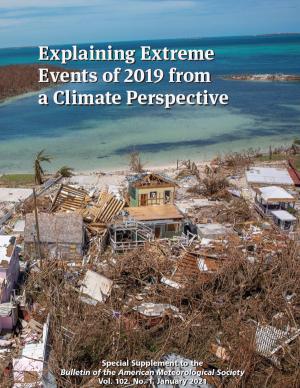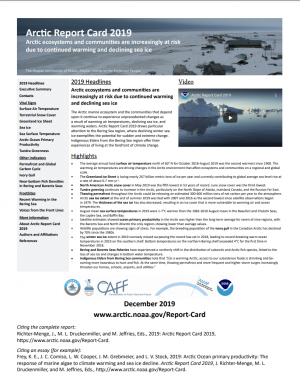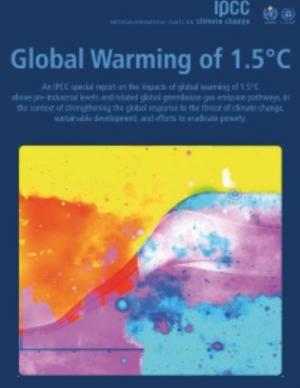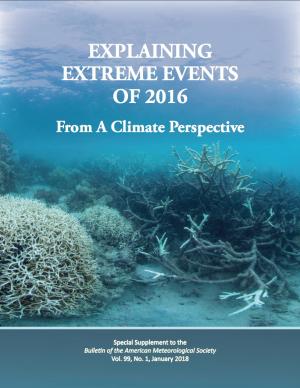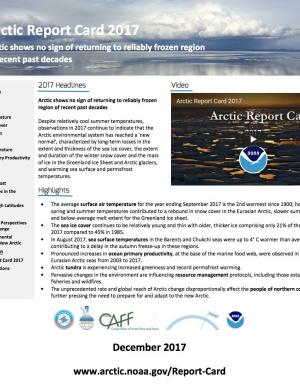Access a range of climate-related reports issued by government agencies and scientific organizations. Browse the reports listed below, or filter by scope, content, or focus in the boxes above. To expand your results, click the Clear Filters link.
The Working Group II contribution to the IPCC Sixth Assessment Report assesses the impacts of climate change, looking at ecosystems, biodiversity, and human communities at global and regional levels. It also reviews vulnerabilities and the capacities and limits of the natural world and human societies to adapt to climate change.
This series of BAMS special reports presents assessments of how human-caused climate change may have affected the strength and likelihood of individual extreme events. The series has been published annually since 2011.
The ninth edition of the report, Explaining Extreme Events in 2019 from a Climate Perspective, presents 15 new peer-reviewed analyses of extreme weather across four continents and one sea during 2019. It features the research of 77 scientists from 7 countries looking at both historical observations and model simulations to determine whether and by how much climate change may have influenced particular extreme events.
The world continues to emit greenhouse gases while the planet's climate is changing faster than ever. This report intends to take up the latest and most essential scientific findings published in an extraordinary year—the climate science year in review.
Arctic ecosystems and communities are increasingly at risk due to continued warming and declining sea ice. The Arctic marine ecosystem and the communities that depend upon it continue to experience unprecedented changes as a result of warming air temperatures, declining sea ice, and warming waters. This 2019 update to the Arctic Report Card draws particular attention to the Bering Sea region, where declining winter sea ice exemplifies the potential for sudden and extreme change. Indigenous Elders from the Bering Sea region offer their experiences of living at the forefront of climate change.
This special report from the Intergovernmental Panel on Climate change describes the impacts of global warming of 1.5 °C above pre-industrial levels. The report also describes potential global greenhouse gas emission pathways, in the context of strengthening the global response to the threat of climate change, sustainable development, and efforts to eradicate poverty.
This BAMS special report presents assessments of how human-caused climate change may have affected the strength and likelihood of individual extreme events. This sixth edition of explaining extreme events of the previous year (2016) from a climate perspective is the first of these reports to find that some extreme events were not possible in a pre-industrial climate.
The Arctic shows no sign of returning to reliably frozen region of recent past decades. Despite relatively cool summer temperatures, observations in 2017 continue to indicate that the Arctic environmental system has reached a "new normal," characterized by long-term losses in the extent and thickness of the sea ice cover, the extent and duration of the winter snow cover and the mass of ice in the Greenland Ice Sheet and Arctic glaciers, and warming sea surface and permafrost temperatures. Issued annually since 2006, the Arctic Report Card is a timely and peer-reviewed source for clear, reliable, and concise environmental information on the current state of different components of the Arctic environmental system relative to historical records. The report is intended for a wide audience, including scientists, teachers, students, decision makers, and the general public interested in the Arctic environment and science.
This report documents that the average temperature in 2015 was over one degree higher than pre-industrial times and that the period 2011–2015 was the warmest five-year period on record, consistent with established warming trends. The report further documents that in 2015 another milestone was reached, with globally averaged CO2 levels of 400 parts per million (ppm). The year 2016 is on track to be even warmer and will be the first year in which CO2 at the Mauna Loa Observatory remains above 400 ppm all year, and for many generations to come.
The probability of extreme climate events since 2011, especially those involving extreme high temperatures, has been substantially increased by climate change, often by a factor of 10 or more. The single most significant event in humanitarian terms, with over 250,000 lives lost, was the 2011–2012 famine in the Horn of Africa, where drought was a major factor.
As climate has warmed over recent years, a new pattern of more frequent and more intense weather events has unfolded across the globe. Climate models simulate such changes in extreme events, and some of the reasons for the changes are well understood. Warming increases the likelihood of extremely hot days and nights, favors increased atmospheric moisture that may result in more frequent heavy rainfall and snowfall, and leads to evaporation that can exacerbate droughts.
Event attribution can answer questions about how much climate change influenced the probability or intensity of a specific type of weather event. As event attribution capabilities improve, they could help inform choices about assessing and managing risk, and in guiding climate adaptation strategies. This report examines the current state of science of extreme weather attribution, and identifies ways to move the science forward to improve attribution capabilities.
This Synthesis Report summarizes the Fifth Assessment Report (AR5) of the Intergovernmental Panel on Climate Change (IPCC). This report distills, synthesizes, and integrates the key findings of the three IPCC Working Group contributions—The Physical Science Basis; Impacts, Adaptation, and Vulnerability; and Mitigation of Climate Change—to the AR5 for the benefit of decision makers in government, the private sector, and the general public. The report also includes findings from two Special Reports released in 2011: Renewable Energy Sources and Climate Change Mitigation and Managing the Risks of Extreme Events and Disasters to Advance Climate Change Adaptation. The Synthesis Report confirms that climate change caused by human activities is having impacts on ecosystems and human well-being across the U.S. and around the world.
A 24-year tradition encompassing the work of 425 authors from 57 countries, 2013's State of the Climate report uses dozens of climate indicators to track patterns, changes, and trends of the global climate system.
The Intergovernmental Panel on Climate Change (IPCC) Working Group II's contribution to the Fifth Assessment Report (AR5) relates to climate impacts, adaptation, and vulnerability. A Summary for Policymakers and the underlying scientific and technical assessment are also available.


